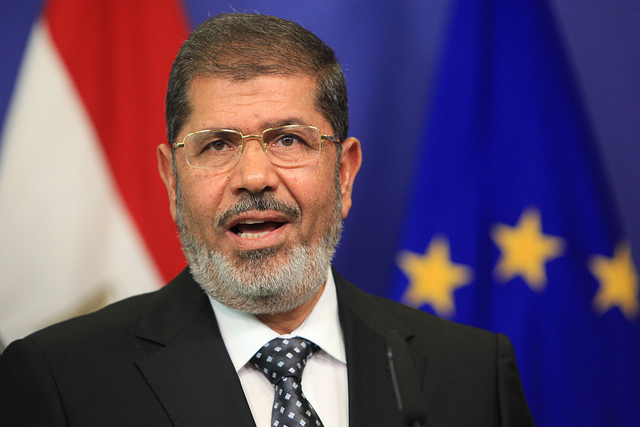
In a letter to Egyptian President Mohamed Morsi, Senator Tim Kaine, Senator Marco Rubio and twelve other senators, expressed deep concern regarding the recent convictions of forty-three pro-democracy, civil society workers in Egypt.
On June 4, Judge Makram Awad sentenced forty-three non-governmental organization (NGO) workers to one to five years of prison. The NGO workers, including up to seventeen Americans, were found to be in violation of Egyptian law, accused of operating without a legal license and for receiving unauthorized funds from abroad for their work.
The senators wrote, “The [US]-Egypt relationship is a strategic and important one, and we value our bilateral security cooperation as an anchor of regional stability.” They further urged the Egyptian government to address their “grave concerns over the verdict against all forty-three NGO workers, return all property that was confiscated in December 2011, and allow these organizations to carry out their work in Egypt without fear of further interference or reprisals.”
A second letter, addressed to President Morsi, signed by 54 members of Congress, stated their ‘severe disappointment’ of the verdict and “call[ed] into serious question Egypt’s progress toward an open society and raises key concerns about Egypt’s commitment to democratic principles in a post-revolutionary context.”
These recommendations are consistent with that of the Working Group on Egypt, co-chaired by Michele Dunne, which presented a letter to President Barack Obama on Tuesday.
On June 12, the Subcommittee on the Middle East and North Africa, chaired by Congresswoman Ileana Ros-Lehtinen, convened for a congressional hearing to hear from witnesses regarding the trial. The witnesses present were Mr. Charles W. Dunne, Freedom House Middle East and North Africa director, the honorable Lorne W. Craner, International Republican Institute president, Ms. Joyce Barnathan, International Center for Journalists president, and Mr. Kenneth Wollack, National Democratic Institute president.
The witnesses, all representatives of the targeted NGOs, presented detailed accounts and testimonies of their work in Egypt, the events leading up to the trial as well as recommendations regarding the bilateral relationship between the two countries, and the United States continued and unconditional aid to Egypt.
Dunne presented three recommendations: reconsidering the delivery of aid to the Egyptian government until the NGO workers are cleared of all charges and the five targeted organizations are allowed to reopen and operate freely; a “top-to-bottom review of the US relationship with Egypt – including US assistance and its support for Egypt’s requested IMF loan package” to be approved by Congress before the aid is released; and lastly, he urged the US government to speak out regarding the importance of a civic and political society as well as condemn abuses when presented with them.
The Honorable Lorne Craner emphasized that “…to overlook the current assault on democracy in the interest of maintaining relations with the Egyptian government would send a wrong-minded message.”
A main point of focus throughout the hearing was the future and hope of an Egyptian democracy as well as its ongoing relationship with Israel. Judge Awad’s remarks, in his opening statement on the day of the final verdict, accused both the United States and Israel of attempting to undermine Egyptian national security. Joyce Barnathan highlighted this saying, “The verdict’s loaded language makes it clear that this was a political dispute between countries. The judges claim that non-governmental organizations may appear to support human rights and democracy, but that the underlying goal is to ‘undermine Egypt’s national security and lay out a sectarian map that serves US and Israeli interests.’”
While the NGO verdict sparked harsh criticism abroad, in Egypt, only a handful of politicians and activists spoke out against the trial’s outcome. Former member of parliament, and head of the Free Egypt Party, Amr Hamzawy described the verdict as shocking and politicized, adding that the victims are both Egyptian and foreign activists, as well as Egypt’s civil society.
Mohamed Anwar al-Sadat, former member of parliament and the head of the Reform and Development Party, criticized the verdict, and expressed his hope that it would be overturned in the appeals process.
Photo: EEAS
Image: Morsi_2.jpg
